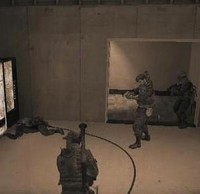Mine-resistant, ambush-protected vehicles, or MRAPs, have saved countless lives in the wars in Afghanistan and Iraq, as their special design absorbs the effects of mines and improvised explosive devices. The U.S. military began ordering almost 28,000 of these heavily armored trucks in 2007, with most of them sent to Iraq, where the Army and Marine Corps put them to use clearing the way for convoys navigating risky terrain. But as the military transitions away from these stability operations and toward a leaner force that will fight shorter conflicts from greater distances, the question of what to do with these vehicles […]
North America Archive
Free Newsletter
As the U.S. soldier accused of slaughtering 16 civilians in Afghanistan on Sunday makes his way back to the United States, the base where the suspect hails from is coming under scrutiny for its controversial record when it comes to military mental health. The soldier in custody, described as a 38-year-old staff sergeant who had served three tours in Iraq before arriving for his deployment in Afghanistan in December, was previously based at Joint Base Lewis-McChord near Tacoma, Washington. He had reportedly suffered from a traumatic brain injury earlier in his career, and his attorney has suggested that a post-traumatic […]

Demands on the State Department may be growing but, if last week’s congressional hearings are any indication, the State Department’s coffers will not be. Even longtime champions of robust international affairs funding like Sen. Patrick Leahy have warned the secretary of state that the $54.7 billion diplomatic and development budget requested by the Obama administration — a modest increase over last year — is unlikely to win full funding. Though increased funding for foreign affairs may well make sense, its chances are remote at best. Merely doing more with less may seem like the best approach under conditions of fiscal […]

As someone who thinks long and hard about global futures, I participate in a lot of professional forums where experts discuss the growing complexity of this world and question the ability of existing political systems, both democratic and authoritarian, to handle it. Some professionals, like Thomas Homer-Dixon, fret about an “ingenuity gap,” while regular readers of this column can attest to my frequent accusation that today’s political leaders lack “strategic imagination.” In short, we’re all arguing that politics isn’t keeping up with economics, much less technology. And it scares us. Things get more depressing when the subject of future generations […]

Energy security has become a strategic as well as an operational imperative for U.S. national security. As tensions continue to escalate with Iran in the Strait of Hormuz, it has become clear that the U.S. military urgently requires new approaches and innovative technologies to improve fuel efficiency, increase endurance, enhance operational flexibility and support a forward presence for allied forces while reducing the vulnerability inherent in a long supply-line tether. Assured access to reliable and sustainable supplies of energy is central to the military’s ability to meet operational requirements globally, whether keeping the seas safe of pirates operating off the […]
